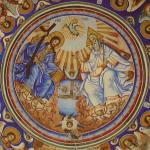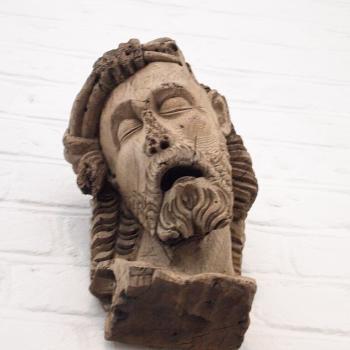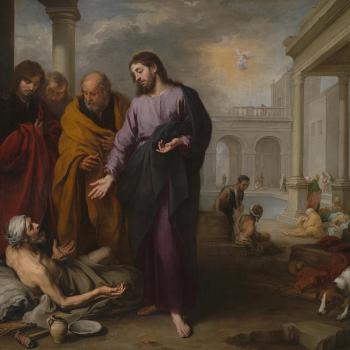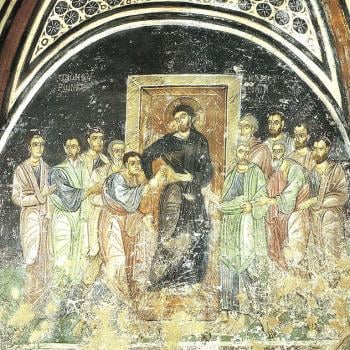
Christians believe Christ is Lord. This is what makes someone a Christian. There are many theological implications which come out of that belief. When we consider what it means to say Christ is Lord, we must contemplate what the title, “Christ,” means as well as what the title, “Lord,” means. Eventually, such explorations lead us to consider how Jesus is both the Christ, the promised anointed one, and the Lord, that is God himself.
We must do more than explore the doctrinal implications of Christ’s Lordship, we must discern what it means to truly have Christ as Lord. When we do, we learn that it means that we must put him above all other things; we cannot follow after him with the love and devotion he expects of us if we find our heart leads us to act contrary to his will. Thus, Jesus indicated, we cannot serve him as Lord if we likewise follow after the decrees of mammon: “No one can serve two masters; for either he will hate the one and love the other, or he will be devoted to the one and despise the other. You cannot serve God and mammon” (Matt. 6:24 RSV).
St. Jerome tells us that if we give into greed, if we accept what greed dictates to us and tells us how to run things, we will find ourselves no longer serving Christ:
Let the greedy hear this, let him hear that the one who is enrolled by the name of Christian cannot serve Christ and riches at the same time. And yet, he did not say: he who has riches, but: he who serves riches. For he who is a slave of riches guards his riches, like a slave; but the one who has shaken off the yoke of slavery distributes them, like a master.[1]
Note, St. Jerome explains that it is not riches themselves, but service towards riches, which turns us away from God. So long as we focus on money as the highest good and the way to judge the character of others, we find ourselves serving money instead of Christ. This is why a world view centered upon capitalism will not engender Christian service, for capitalism focuses on money and its accumulation. Capitalism suggests that those who do good with such accumulation of wealth are viewed as good, while those who do not, are viewed as deficient in the good, and so considered worthless because of their poverty. Money, wealth, is the highest good according to capitalism, putting it in clear contention with Christ. This is why a capitalistic worldview must be rejected, for it makes people serve mammon instead of Christ.
It is important to also realize, as St. Jerome did, that possessing wealth, by itself, is not evil. It is what we do with money which determines whether or not we follow after Christ or if we follow mammon. Those who have great wealth, desire more of it, and will do all they can to both accumulate more wealth and keep what they already have, are possessed by avarice and need that evil spirit exorcised from their life if they are to follow after Christ. Often, this means, they have to give up the wealth which they have, just like alcoholics have to give up drinking alcohol. This, of course, is one of the reasons why many, in order to follow Christ, give up on secular affairs and take on the religious habit. Perhaps this was the reason why St. Mewan of Brittany (who died on June 21, circa 611-617) became a monk, for, it is said, he was born in South Wales to a noble family but gave all he had away in order to take on the religious life. He followed after his kinsman, St. Samson, to Brittany, where he then became a notable preacher and founder of the monastery of St. John the Baptist of Gael (later, St. Meen’s, named after him), thanks, in part, to benefactors, like Count Caduon and Count Guerech I of Vannes.
Among those who heeded the message of St. Mewan was St. Judical, son of King Hoel III and Pritelle. Divesting himself from his wealth and position of authority, he became a monk under St. Mewan. It is said that after the death of St. Mewan, he temporarily left the monastery, was elected king, married, and then, in 642, he once again became a monk at the monastery of St. Meen, where he lived out this remainder of his life. St. Judical shows how it is possible to renounce the world and to live out that renunciation while being called by God to work for the common good in it: he did not hold to wealth, nor to his own personal monastic desires; rather, he found himself following God wherever God would send him, so that he could serve as king and still die following his heart’s desire as a monk. His wealth, his power and authority, did not get the best of him because he detached himself from it, but, as detachment is not a nihilistic endeavor, he was able to employ their use for the good of others when he was called into secular service. He did not hold to it, nor let it possess him, rather, he transcended it and so could use it for the common good, and thus, for God’s glory.
We are all called to follow Christ, and to cut ourselves off from any attachments which would keep us away from our love for him. And that attachment might be, for some, a religious vocation. What use is it if we follow after such a vocation for the wrong reason? What is important is to live in the world but not attached to it, or to any way of life, so that we can follow after Christ, finding our character growing through the various trials and temptations we face in as we try to serve Christ the best we can. Of course, we will do this imperfectly, we will make mistakes, we will sin, but if we truly seek after Christ so as to have him as our Lord, we shall find ourselves justified by faith and will receive, as Paul says, God’s love pouring in us:
Therefore, since we are justified by faith, we have peace with God through our Lord Jesus Christ. Through him we have obtained access to this grace in which we stand, and we rejoice in our hope of sharing the glory of God. More than that, we rejoice in our sufferings, knowing that suffering produces endurance, and endurance produces character, and character produces hope, and hope does not disappoint us, because God’s love has been poured into our hearts through the Holy Spirit who has been given to us (Rom. 5:1-5 RSV).
The world will challenge us with its enticements. What it offers are goods, established by God, but we must recognize them for them for what they are, relative goods which can and should be used insofar as they do not keep us away from the greater good, which is God himself. We should not become attached to them in our hearts so as to make the world and all its goods our master. We should remember God, and be his stewards over creation, working on his behalf to make sure the good of the earth remains good, and not abused. We are to make creation, and the goods of the earth, work with us in our service with God, not, of course, by becoming abusive tyrants over creation, but rather, by mediating God’s grace with it and all that is within it. We are to serve God, not mammon, but this must not be gnostically interpreted. We must not nihilistically deny the world. We are only to deny its control over us. Love for God will lead us to seek his will to be done on earth as it is in heaven. Thus, once we deny its control over us, we can truly become stewards of the earth and work for its good while serving God. We will not find our love for God turning us away from our neighbor, but rather, we will see our love for God manifested in our love for our neighbor, and that is why our service to Christ should never render us completely cut off from the world. This is why some of us , like St. Mewan, will follow that call with a religious vocation, while others, like St. Judical, will find that service is found in the world, working with and for the people and the common good. So long as we do so for the sake of God’s glory, and keep God at the focus of what we do, then we will find ourselves properly engaging the world and not allowing it and its enticements get the best of us.
[1] St. Jerome, Commentary on Matthew. Trans. Thomas P. Scheck (Washington, DC: CUA Press, 2008), 90.
Stay in touch! Like A Little Bit of Nothing on Facebook.
If you liked what you read, please consider sharing it with your friends and family!













